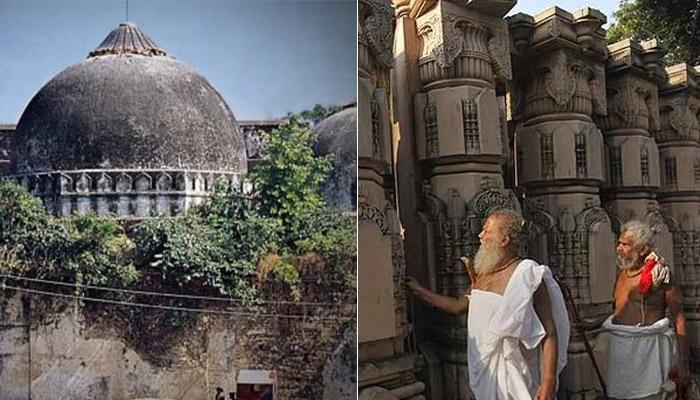New Delhi: Hearing the Ayodhya title dispute suit Supreme Court on Wednesday decided to examine the apex court’s 1994 verdict in the dispute case where the court had previously held “offering namaz in a mosque is not an essential and integral part of Islam and Muslims can offer prayers anywhere”.
The three-Judge bench headed by Chief Justice of India Dipak Misra and Justices Ashok Bhushan and Abdul Nazeer had agreed to examine the apex court’s verdict after Counsel appearing for Muslims Rajeev Dhawan, argued that the verdict was not in accordance with Muslim religion and that it needed to be reconsidered, ruling out that the case will now be referred to a larger five Judge bench for examination.
Dismissing the intervention application filed by third parties not connected with the title dispute, and also a compromise statement signed by nearly 10,523 residents of Ayodhya and Faizabad, the three-judge bench said it cannot compel the parties involved in the Title Suit to reach a settlement since the dispute is purely and largely a legal issue and such a compromise could have its effects outside Court.
Previously in 1994, a five-judge Constitution Bench, headed by then CJI M N Venkatchalliah, had held that, “under the Mohammedan Law applicable in India, title to a mosque can be lost by adverse possession…. If that is the position in law, there can be no reason to hold that a mosque has a unique or special status, higher than that of the places of worship of other religions in secular India to make it immune from acquisition by exercise of the sovereign or prerogative power of the State. A mosque is not an essential part of the practice of the religion of Islam and namaz (prayer) by Muslims can be offered anywhere, even in open.”
Counsel appearing for Muslims, Rajeev Dhawan pointed out that the 1994 verdict had sidelined Muslims rights to offer namaz at Babri Masjid saying offering Namaz “is not an essential and integral part of Islam” ordering a “status quo” recognizing Hindus right to worship at the dispute land and if the verdict is not considered then a mosque would never be constructed on the disputed land.
While deciding the title dispute in 2010 the Allahabad High Court relying on 1994’s status quo verdict observed the sentiments of Hindus on offering worship should be recognized and allotted one-third of the land to Hindus, one-third to Ram Lulla, and one third to Muslims.
When the three-Judge bench said it will deal the title suit as ‘a purely land dispute’, and other issues were irrelevant in the case, Rajeev Dhawan said not considering Muslims rights in the title case was wrong since in 1934, the British had already considered Muslims rights to offer prayers at Babri Masjid and rebuilt a mosque but this right was completely avoided by Supreme Court’s verdict in 1949 after the country got Independence.
Mr Dhawan said Muslims can never accept the criminality of demolishing Babri Masjid on 6 December 1992 by Hindus who also placed Lord Ram’s idol at the disputed site, he said, “Our right to offer prayers was not taken into consideration in the 1994 verdict,” and that the Hindus rights to worship was decided on illegality. He argued why did the Supreme Court not considered Muslims right to worship while giving the 1994’ verdict.
While counsel appearing for Hindus argued that the disputed land was the birthplace of Lord Ram and that the whole area should be allotted to Hindus for the construction of Ram Mandir and that there is no reason of allotting one-third land to Muslims.
The Counsel appearing for Muslims raised several other relevant questions where the Court has sidelined the demolishing of Mosque by Hindus during the case’s pendency, whether such a relief should have been granted to the plaintiffs and whether the court was right in considering evidences prior to 1528 which are religious sculptures and text while ignoring supporting evidences with effect from 1528 until 6 December 1992 and why the act of demolishing was not considered as illegal and tried as vandalism, Asianage reported.

